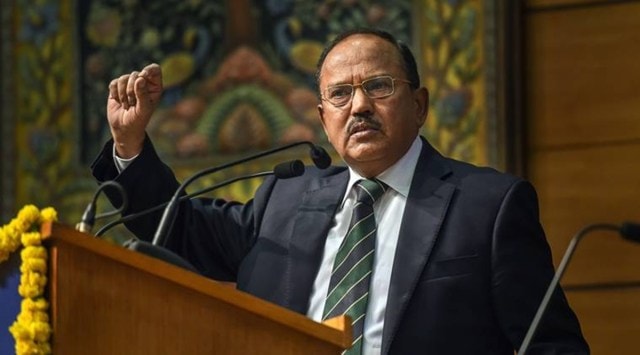NATIONAL SECURITY Advisor (NSA) Ajit Doval said on Tuesday that terrorism is not linked to any religion and that it is the duty of spiritual and religious leaders to counter “anyone who takes the path of violence”.
“Terrorism is not linked to any religion, it is the individuals that get misguided and it is probably the duty of spiritual and religious leaders to see that they can belong to any religion, faith, belief system or political ideology, but anyone who takes the path of violence will have to be countered as effectively,” he said at a gathering of religious leaders, scholars and diplomats at the India Islamic Cultural Centre here.

He said no religion was under threat in India, which, as an inclusive democracy, had successfully managed to provide space to all its citizens regardless of their religious, ethnic, or cultural background. “No religion is under any threat here. As a proud civilisational state, India believes in promoting tolerance, dialogue, and cooperation to deal with the challenges of our time. It was no coincidence that despite having around 200 million Muslims, the involvement of Indian citizens in global terrorism has been incredibly low,” Doval said.
The NSA said Islam occupies a “unique and significant position” among India’s numerous religions. The country, he said, is home to the second-largest Muslim population in the world. “Indian Muslim population is almost equal to the combined population of around 33 member states of the Organisation of Islamic Cooperation,” Doval said, sharing the stage with Muslim World League Secretary-General and Saudi Arabia’s former Minister for Justice Mohammad bin Abdulkarim al-Issa, who is on a six-day visit to India.
The event, which was organised by Khusro Foundation, was also attended by Syed Naseruddin Chishty, the chairman of the All India Sufi Sajjadanashin Council; former Deputy NSA Pankaj Saran; MP Hans Raj Hans; former Chief Election Commissioner S Y Quraishi; diplomats from the embassies of Malaysia, Iran, Oman, Jordan and Egypt; and faith leaders from various communities.
The NSA went on to say that India is a “melting pot of cultures, religions, and languages that coexist in harmony”. “As an inclusive democracy, India has successfully managed to provide space for all its citizens, regardless of their religious, ethnic or cultural backgrounds … The edifice of modern India is built on the principles of equal rights, equal opportunities and equal responsibilities. This equality is guaranteed by our Constitution and law …,” he said.
“Dissent does not mean disintegration, dissent does not essentially mean a confrontation. But in this country, because of your thought, because of your ideas, no one is under threat,” he added.
Mentioning the challenge of extremism and global terrorism, Doval said, “To preserve the security and stability within our borders and also rise to the security challenges beyond, India has been leading the fight against individuals and organisations who are promoting extremism, narcotics and terrorism.”
In this context, he recalled the terrorist attack on the Grand Mosque in Mecca in 1979 and how that incident became a turning point in the way Saudi Arabia looked at itself and the rest of the world. “The attack brought the issue of terrorism to the forefront and forced Saudi Arabia to reevaluate its security measures and foreign policy,” he said.
Story continues below this ad
Doval made a special reference to the “excellent relations” between India and Saudi Arabia, saying they are rooted in “shared cultural heritage, common values, and economic ties”. He also spoke of how the leaders of the two countries share a common vision of the future.
Addressing al-Issa, Doval said, “Your deep understanding of Islam and religions of the world, incessant efforts towards interfaith harmony, courage to lead on the path of reforms, is not only contributing to a better understanding of Islam and its seminal contribution to humanity but also preventing extremist and radical ideologies that plague our young minds.”
In his address, al-Issa appreciated India’s long history and diversity and its secular Constitution. “India is a great model of coexistence for the world,” he said, adding that Indian wisdom had done a lot of good to humanity.
The former Saudi minister said Indian Muslims contribute to its diversity. “The Muslims are very proud of their nationality and they also contribute to the diversity of India,” al-Issa said, adding that the need of the hour was the establishment of communication between cultures.
He said the Muslim World League had collaborated with many Hindu organisations in India. “We have many common values with many Hindu leaders and we respect the differences,” he said, adding that he would like to send a message to the global community from the stage. “Tolerance and coexistence is not something that should be talked only about at conferences but should be implemented on the ground. Muslims are not only supposed to appreciate coexistence but it’s also their religious obligation.”
Story continues below this ad
The former Saudi minister called upon Muslims across the globe to become representatives of the true message of Islam. “India is an inspiration to the rest of the world for being open to dialogue; our partnership with India is a message to the whole world,” al-Issa said, adding that his presence in India was a message to the world.
Later in the day, the former Saudi minister met Prime Minister Narendra Modi, and held “insightful discussions on various aspects of furthering inter-faith harmony, peace and working towards human progress”, according to a Twitter post by the Prime Minister’s Office. Al-Issa is scheduled to hold discussions with External Affairs Minister S Jaishankar and Minority Affairs Minister Smriti Irani and is also likely to meet President Droupadi Murmu.









